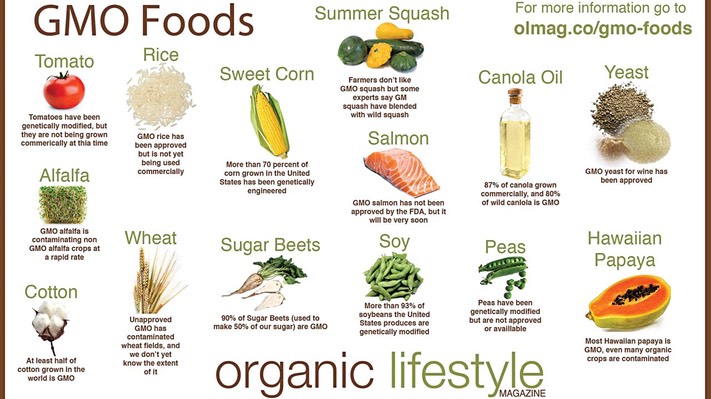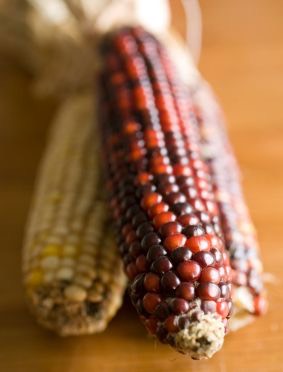

Normal yellow corn cob alongside reddish brown GM corn cob
It's virtually impossible to provide a complete list of genetically modified food (GMO food) in the United States because there aren't any laws for genetically modified crops!
Some estimates say as many as 30,000 different products on grocery store shelves are "modified." That's largely because many processed foods contain soy. Half of North America's soy crop is genetically engineered!
So what can we do to avoid GMO?
1. Purchase Non GMO processed that are labeled as such.
2. Buy organic.
3. Buy from trusted growers at your local farmers markets.
4. Grow your own garden produce from heirloom seeds or plants from trusted merchants/greenhouses who don’t sell GMO seeds/sets.
Below are foods grown or produced from GM crops
- Rapeseed - Resistance to certain pesticides and improved rapeseed cultivars to be free of erucic acid and glucosinolates. Gluconsinolates, which were found in rapeseed meal leftover from pressing, are toxic and had prevented the use of the meal in animal feed. In Canada, where "double-zero" rapeseed was developed, the crop was renamed "canola" (Canadian oil) to differentiate it from non-edible rapeseed.
- Honey - Honey can be produced from GM crops. Some Canadian honey comes from bees collecting nectar from GM canola plants. This has shut down exports of Canadian honey to Europe.
- Cotton - Resistant to certain pesticides - considered a food because the oil can be consumed. The introduction of genetically engineered cotton plants has had an unexpectedly effect on Chinese agriculture. The so-called Bt cotton plants that produce a chemical that kills the cotton bollworm have not only reduced the incidence of the pest in cotton fields, but also in neighboring fields of corn, soybeans, and other crops.
- Rice - Genetically modified to contain high amounts of Vitamin A. Rice containing human genes is to be grown in the US. Rather than end up on dinner plates, the rice will make human proteins useful for treating infant diarrhea in the developing world.
- Soybean - Genetically modified to be resistant to herbicides - Soy foods including, soy beverages, tofu, soy oil, soy flour, lecithin. Other products may include breads, pastries, snack foods, baked products, fried products, edible oil products and special purpose foods.
- Sugar cane - Made resistant to certain pesticides. A large percentage of sweeteners used in processed food actually comes from corn, not sugar cane or beets. Genetically modified sugar cane is regarded so badly by consumers at the present time that it could not be marketed successfully.
- Tomatoes - Made for a longer shelf life and to prevent a substance that causes tomatoes to rot and degrade.
- Corn - Resistant to certain pesticides - Corn oil, flour, sugar or syrup. May include snack foods, baked goods, fried foods, edible oil products, confectionery, special purpose foods, and soft drinks.
- Sweet corn - genetically modified to produces its own insecticide. Officials from the US Food and Drug Administration (FDA) have said that thousands of tonnes of genetically engineered sweetcorn have made their way into the human food supply chain, even though the produce has been approved only for use in animal feed. Recently Monsanto, a biotechnology food producer, said that about half of the USA's sweetcorn acreage has been planted with genetically modified seed this year.
- Canola - Canola oil. May include edible oil products, fried foods, and baked products, snack foods.
- Potatoes - (Atlantic, Russett Burbank, Russet Norkatah, and Shepody) - May include snack foods, processed potato products and other processed foods containing potatoes.
- Flax - More and more food products contain flax oil and seed because of their excellent nutritional properties. No genetically modified flax is currently grown. An herbicide-resistant GM flax was introduced in 2001, but was soon taken off the market because European importers refused to buy it.
- Papaya - The first virus resistant papayas were commercially grown in Hawaii in 1999. Transgenic papayas now cover about one thousand hectares, or three quarters of the total Hawaiian papaya crop. Monsanto, donated technology to Tamil Nadu Agricultural University, Coimbatore, for developing a papaya resistant to the ring-spot virus in India.
- Squash - (yellow crookneck) - Some zucchini and yellow crookneck squash are also GM but they are not popular with farmers.
- Red-hearted chicory - (radicchio) - Chicory (Cichorium intybus var. foliosum) is popular in some regions as a salad green, especially in France and Belgium. Scientists developed a genetically modified line of chicory containing a gene that makes it male sterile, simply facilitating the production of hybrid cultivars. Today there is no genetically modified chicory on the market.
- Cotton seed oil- Cottonseed oil and linters. Products may include blended vegetable oils, fried foods, baked foods, snack foods, edible oil products, and small-goods casings.
- Tobacco -The company Vector has a GMO tobacco being sold under the brand of Quest cigarettes in the U.S. It is engineered to produce low or no nicotine.
- Meat - Meat and dairy products usually come from animals that have eaten GM feed.
- Peas - Genetically modified (GM) peas created immune responses in mice, suggesting that they may also create serious allergic reactions in people. The peas had been inserted with a gene from kidney beans, which creates a protein that acts as a pesticide.
- Vegetable Oil - Most generic vegetable oils and margarines used in restaurants and in processed foods in North America are made from soy, corn, canola, or cottonseed. Unless these oils specifically say "Non-GMO" or "Organic," it is probably genetically modified.
- Sugarbeets - May include any processed foods containing sugar. [Webmaster note: ALL sugar beets grown in the US are GMO]
- Dairy Products - About 22 percent of cows in the U.S. are injected with recombinant (genetically modified) bovine growth hormone (rbGH).
- Vitamins - Vitamin C (ascorbic acid) is often made from corn, vitamin E is usually made from soy. Vitamins A, B2, B6, and B12 may be derived from GMOs as well as vitamin D and vitamin K may have "carriers" derived from GM corn sources, such as starch, glucose, and maltodextrin.
How can the public make informed decisions about genetically modified (GM) foods when there is so little information about its safety?
According to the FDA and the United States Department of Agriculture (USDA), there are over 40 plant varieties that have completed all of the federal requirements for commercialization.
Future planned applications of GMOs are diverse and may include drugs in foods, for example, bananas that produce human vaccines against infectious diseases such as Hepatitis B, metabolically engineered fish that mature more quickly, fruit and nut trees that yield years earlier, and plants that produce new plastics with unique properties.
"History has many records of crimes against humanity, which were also justified by dominant commercial interests and governments of the day. Despite protests from citizens, social justice for the common good was eroded in favor of private profits. Today, patenting of life forms and the genetic engineering which it stimulates, is being justified on the grounds that it will benefit society, especially the poor, by providing better and more food and medicine. But in fact, by monopolizing the 'raw' biological materials, the development of other options is deliberately blocked. Farmers therefore, become totally dependent on the corporations for seeds." - Professor Wangari Mathai.
"Any politician or scientist who tells you these products are safe is either very stupid or lying. The hazards of these foods are uncertain. In view of our enormous ignorance, the premature application of biotechnology is downright dangerous." - David Suzuki, CC, OBC, Ph.D LLD, Geneticist.